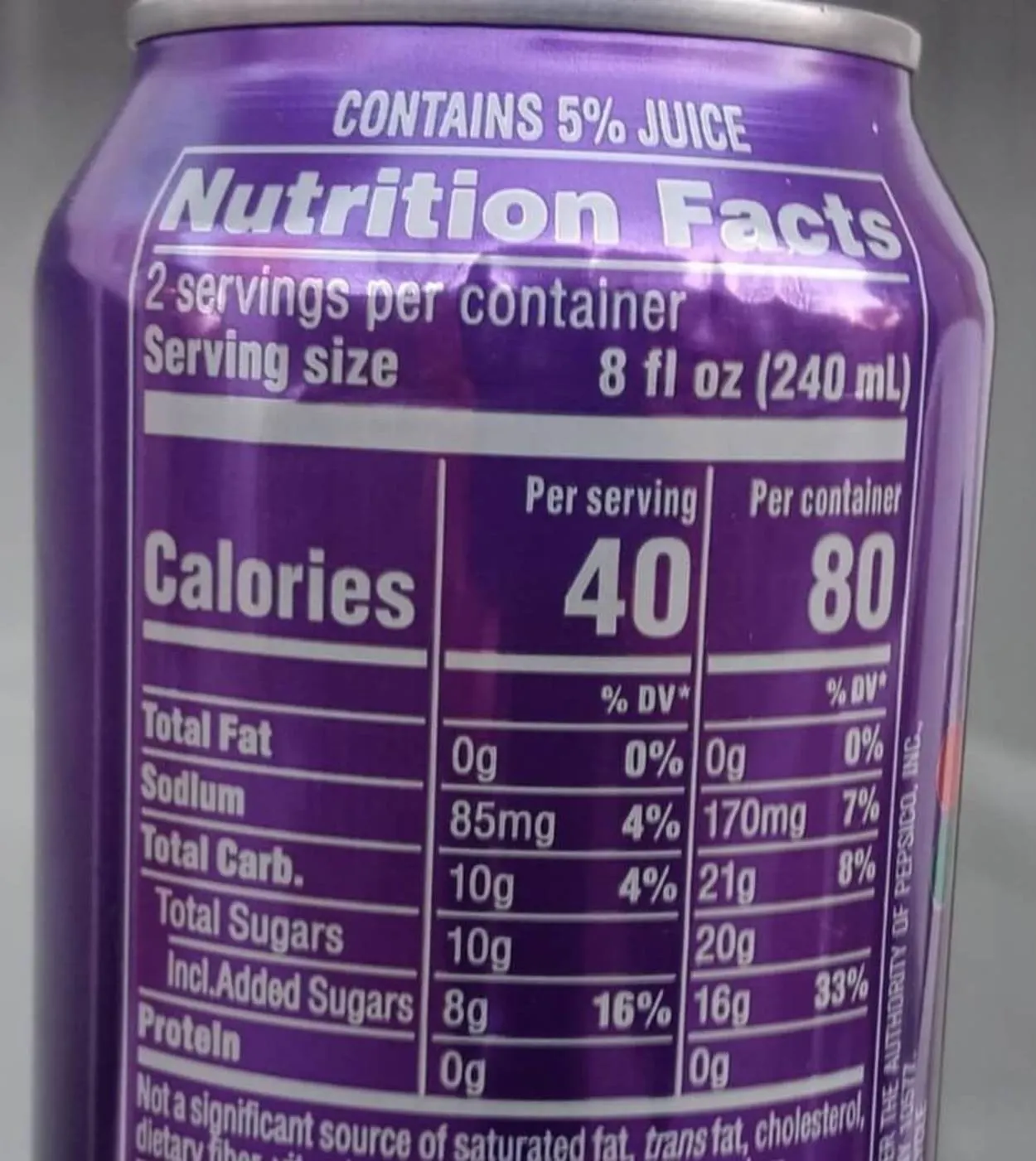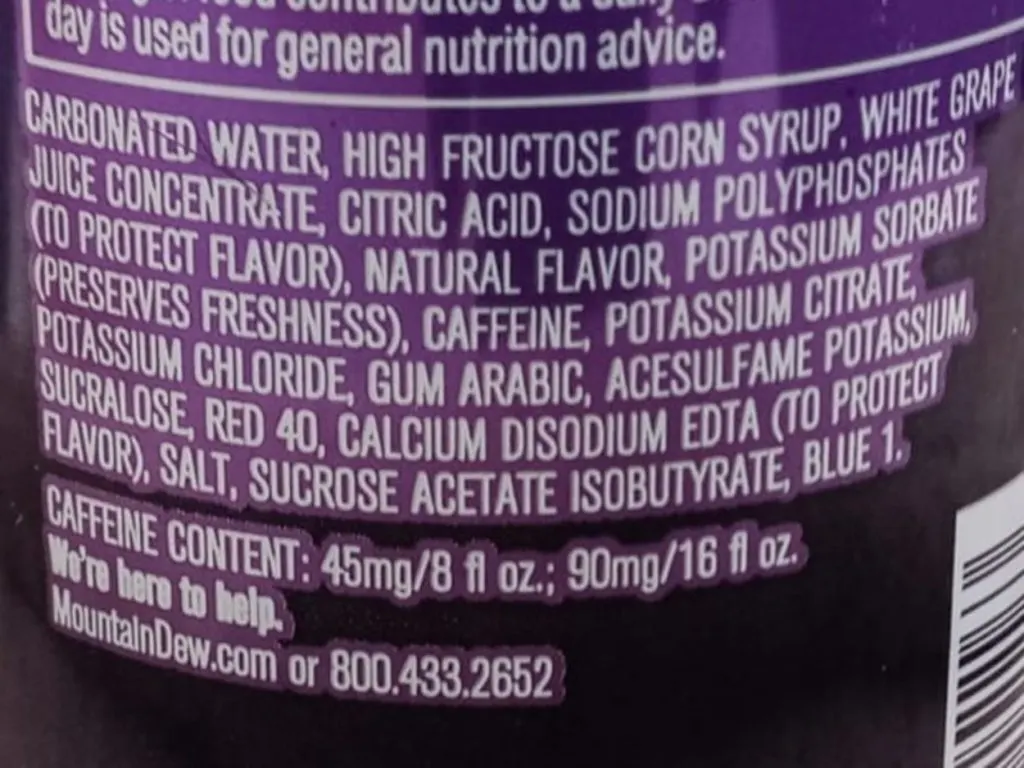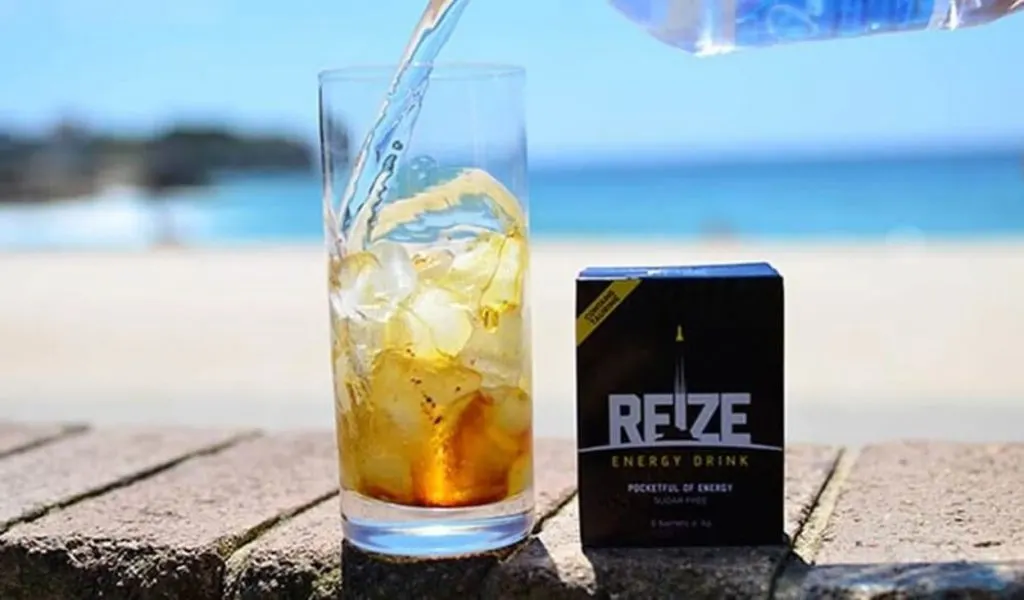If you want a dose of energy with a nostalgic taste, Mountain Dew Kickstart is the answer to that.
But are you aware of what’s inside your energy drink and what you’re getting out of it? And, how nutritious is Mountain Dew Kickstart to you?
Summary: A regular 16 fl. oz can of Mountain Dew Kickstart has 80 calories, 90mg of caffeine, 20g of sugar, and 170mg of sodium.
Of course, there’s more than meets the eye to this drink.
If you are interested to know more about Mountain Dew Kickstart and how its nutritional values may affect you, stick around…
Mountain Dew Kickstart Nutrition Facts

Comparing the nutrition facts of Red Bull with some of its closest competitors.
| Typical Value (Standard Serving) | Mountain Dew Kickstart (16 fl. oz) | Reign (16fl.oz) | Full Throttle (16fl.oz) |
| Energy | 80 calories | 10 calories | 230 calories |
| Protein | 0g | 0g | 0g |
| Fat (Of Which Saturated) | 0g (0g) | 0g (0g) | 0g (0g) |
| Carbohydrate (Of which sugars) | 21g (20g) | 3g (0g) | 57g (55g) |
| Sodium | 170mg | 200mg | 160mg |
| Caffeine | 90mg | 300mg | 40mg |
| Vitamin B3 (niacin) | – | 21.6mg | 46mg |
| Vitamin B6 | – | 2.0mg | 4.08mg |
| Vitamin B12 | – | 6.25μg | 12μg |
Mountain Dew Kickstart Calorie Content
A single 16 fl. oz can of Mountain Dew Kickstart contains 80 calories, which is quite a moderate amount for an energy drink for its size.
If you’re looking for a low-calorie energy drink, Mountain Dew Kickstart certainly doesn’t fit the description.
But, compared to an 8.4 fl. oz can of Red Bull with 110 calories, Mountain Dew Kickstart is definitely lower than the average.
Given that the recommended daily calorie intake is 2000 and 2500 calories for women and men respectively, a can of Mountain Dew Kickstart occasionally won’t leave a huge dent in your overall diet.
Regardless, while it doesn’t have high-calorie content, it’ll pile up pretty quickly over a long period of time if you don’t control your intake.
Mountain Dew Kickstart gives you some calories to burn off but it’s not a replacement for a meal, so grab something more substantial to fill yourself up instead if you’re feeling hungry.
In any case, be sure to control your consumption of Mountain Dew Kickstart and always have a meal instead of substituting it with an energy drink instead.
Ingredients In Mountain Dew Kickstart

Here’s a quick list of the ingredients in a 16 fl. oz can of Mountain Dew Kickstart, with the more interesting ones discussed in the sections below:
- Carbonated Water
- High fructose corn syrup
- White grape juice concentrate
- Citric acid
- Sodium polyphosphates (preservative)
- Natural flavor
- Potassium sorbate (preservative)
- Caffeine
- Potassium Citrate
- Potassium chloride
- Gum Arabic
- Sucralose (artificial sweetener)
- Red 40 (coloring)
- Calcium disodium EDTA
- Sucrose acetate isobutyrate
- Salt
- Blue 1 (coloring)
How Much Caffeine Is In Mountain Dew Kickstart?
Every 16 fl. oz can of Mountain Dew Kickstart has 90mg of caffeine, which is a fairly modest amount.
Caffeine can go a long way as it has plenty of benefits, from making you more alert to improving your cognition, as well as enhancing your physical performance.
Considering that energy drinks can have up to 300mg of caffeine per serving, Mountain Dew Kickstart is pretty moderate in caffeine content.
Still, depending on your caffeine metabolism, Mountain Dew Kickstart can definitely give you a caffeine kick.
The FDA advises that healthy adults can have up to 400mg of caffeine in a day. Anything else than that, and you may wind up with unfavorable side effects such as:
- Restlessness and shakiness
- Dizziness
- Headaches
- Rapid heart rhythm
- Dehydration
- Anxiety
Hence, you should moderate your caffeine intake to a tolerable limit each day, and try not to have too many caffeinated beverages in a day either.
For more information on how caffeine can affect us, check out this video:
How Much Sugar Does Mountain Dew Kickstart Have?
There is 20g of sugar in each 16 fl. oz can of Mountain Dew Kickstart.
Although it’s not exactly a zero-calorie or sugar-free energy drink, Mountain Dew Kickstart doesn’t have the largest amount of sugar, unlike other brands like Monster and Full Throttle.
For guidance, the AHA recommends a daily sugar intake of 36g and 25g for men and women, respectively.
As such, having a can of Mountain Dew Kickstart shouldn’t be too harmful to your health provided you consume in moderation.
While having some sugar every now and then is okay, having too much, in the long run, can lead to severe health problems, especially diabetes.
Some of the health issues you can develop from having a diet high in sugar are:
- Cardiovascular diseases
- Weight gain
- High blood pressure
- Tooth decay
- Aging skin
Moreover, you’ll be more prone to a sugar crash, which isn’t a scenario you’d want if you plan on working on your tasks longer.
Generally, it’s always best to keep your consumption of Mountain Dew Kickstart to a moderate level to avoid adverse effects.
If you prefer to do away with sugar entirely, check out the article I’ve written on the best energy drinks with less sugar for some great recommendations.
Does Mountain Dew Kickstart Have Artificial Sweeteners?
A 16 fl. oz can of Mountain Dew Kickstart contains two artificial sweeteners, namely; sucralose and acesulfame potassium.
As these sweeteners are calorie-free and carb-free, you can rest assured that your daily calorie intake won’t be affected if you happen to be following a diet.
Artificial sweeteners are used to supplement the sugar already present in the drink, so you can definitely expect the experience of drinking one to be sweeter than average.
There’s also no need for you to worry about the safety of these sweeteners, as they’re approved by the FDA for consumption and use.
Still, it’s always better to practice moderation with artificial sweeteners, as we don’t know a whole lot about them and their potential side effects yet.
Is Mountain Dew Kickstart Bad For You?
Mountain Dew Kickstart is not that bad if consumed in moderation.
To be honest, with its fairly low caffeine and sugar content, Mountain Dew Kickstart surely isn’t the unhealthiest energy drink you can have, though it’s not advisable to have it too often.
The best way to keep yourself safe from the side effects of this energy drink is by moderating your daily caffeine and sugar intake. This means having Mountain Dew Kickstart only when you really need it.
Whatever the case, as long as you have a balanced diet and healthy lifestyle, the most you’ll get from Mountain Dew Kickstart is its sweet taste and energy boost.
Is Mountain Dew Kickstart Worse Than Coffee?
Like Mountain Dew Kickstart, coffee is also a caffeinated beverage and can often have more sugar than necessary. Thus, I wouldn’t say that Mountain Dew Kickstart is any worse than a cup of coffee.
It can be difficult to fully come up with a catch-all answer to a question like this.
After all, there are a number of factors that go into deciding whether a cup of coffee is better or worse than energy drinks such as caffeine content, additional sweeteners, and type of coffee.
In general, coffee is made from coffee beans, contains antioxidants, and is nearly calorie-free (unless you add in sugar or cream, which definitely increases its calorie count).
Mountain Dew Kickstart, on the other hand, has natural ingredients like high fructose corn syrup and fruit concentrate, something that coffee doesn’t have.
Fundamentally though, both coffee and Mountain Dew Kickstart affect you in similar ways, so it’s never a good idea to have too much of either of these beverages.
All things considered, it doesn’t really matter which is better; it all boils down to personal preference and having an enjoyable experience while you get your everyday boost.
How Many Cans Of Mountain Dew Kickstart Can I Have In A Day?
You can have one can of Mountain Dew Kickstart in a day.
Though having two cans of Mountain Dew Kickstart won’t put you over the daily caffeine limit, it would mean consuming 40g of sugar in one day, which isn’t healthy at all.
At this point, I’ll be more worried about the oncoming sugar crash.
Hence, it’s way safer to stick to one serving of Mountain Dew Kickstart per day to maintain your health and well-being.
If you’re still in need of a boost after finishing one can, you can go for other caffeinated beverages like coffee and herbal teas.
Mountain Dew Kickstart Energy Drink Side Effects
While Mountain Dew Kickstart has a pretty standard level of caffeine, it contains a large quantity of sugar that could lead to serious health issues if you don’t moderate your consumption.
To break it down for you, I’ve made a quick table below that compares the caffeine and sugar content of Mountain Dew Kickstart against their daily limits:
| Mountain Dew Kickstart (16fl.oz) | Daily Limit | |
| Caffeine | 90mg | 400mg |
| Sugar | 20g | 25g (women) / 36g (men) |
Despite the fact that Mountain Dew Kickstart’s sugar content is below the daily limit, it’s still a pretty unhealthy amount to have in one serving.
Plus, this drink also contains artificial sweeteners, which means that it’s super sweet.
Personally, I wouldn’t want something so sugary to be included in my diet.
Moreover, the excessive consumption of sugar could lead to health problems like:
- Obesity
- Diabetes
- An increased risk of heart disease
- An increased risk of kidney damage
- Depression
- High blood pressure
- Inflammation
While it’s completely fine to drink a can of Mountain Dew Kickstart for the energy boost, make sure you’re not depending on it too much because it could eventually lead to an addiction.
If you want to cut down on sugar while still getting your daily boost, you can check out my article on All-Natural Energy Drinks for some healthier options.
Alternatives To Mountain Dew Kickstart
While Mountain Dew Kickstart might be a good pick-me-up, here’s a list of other amazing options that may tickle your fancy:
- Red Bull
- Monster
- Raze
- 3D Energy
- Celsius
- Reign
- Rockstar
- Bang
- Xyience
- Xtend Energy
- Adrenaline Shoc
- Game Fuel
You could also give powdered energy drinks since they’re adjustable according to your preferences and needs:
- Zipfizz
- Advocare Spark
- G Fuel
- REIZE (my number one choice)
REIZE (10 Out Of 10)

Looking for an energy drink that isn’t too sweet? Why not give REIZE a shot?
REIZE is a powdered energy drink that comes in light 4g sachets, making it very convenient for you to bring it around wherever you go.
With a sensible 50mg of caffeine, REIZE is also sugar-free and has only 11 calories per serving. As REIZE has a small content, it won’t leave much of an impact on your overall diet.
Besides, REIZE is packed with beneficial ingredients like B-group vitamins, taurine, and ginseng that combine together to provide you with a smooth energy boost – no crashes involved.
The best part? REIZE ships right to your doorstep for only around $1 per drink, which is outstanding value for money.
Give REIZE a try, and you might agree that it’s a smarter choice than Mountain Dew Kickstart.

